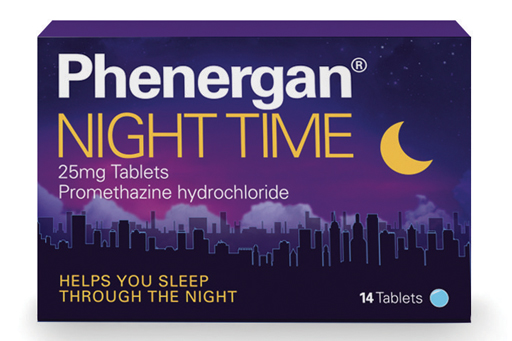Latest

Category clinic: Managing insomnia
In Latest
Discover the latest pharmacy news with daily updates and information to keep you in the know.Bookmark
Record learning outcomes
Insomnia is a common problem, with one in three people suffering from the condition.1 This can negatively impact their quality of life, but pharmacy teams can help by recommending a product to help break the cycle of poor sleep for people with short-term insomnia

Insomnia can be categorised by duration: short-term if it lasts between one to four weeks, and long-term if it lasts for more than four weeks. It is also classified according to the cause: primary insomnia – when it is not associated with other conditions, or secondary insomnia – when another cause has been identified (for example, a medical condition).2
Primary insomnia usually lasts for at least a month and is commonly the result of ‘conditioning’ – where people get into a routine of sleeping badly after an initial trigger (for example, stress), but it continues after this has passed.2
There can be many causes for poor sleeping and these may include environmental factors, physical health, stress and anxiety, or lifestyle factors.3 Â
Environmental: this may include an uncomfortable bed, or a room that is too bright, has extremes of temperature or is noisy.Â
Physical health: there are many potential health problems that could result in insomnia. These include long-term pain, hormonal problems (for instance, overactive thyroid), respiratory conditions or restless leg syndrome, to give some examples.
Stress and anxiety: these can make sleeping difficult if someone is worried about their work, family or health. These concerns can keep the mind racing at night and lead to disrupted sleep.
Lifestyle: people who work shifts or travel through time zones may have disrupted sleep patterns. Drinking alcohol can also affect sleep, as can stimulants such as coffee or nicotine if taken or used before bedtime.
Pharmacy helpÂ
Even though disturbed sleep has a high prevalence and it impacts on quality of life causing irritability, moodiness, and anxiety, as well as affecting the ability to concentrate, around two-thirds of people don’t manage the condition on a regular basis.4Â
This can result in a cycle of sleep deprivation, which inevitably has a negative emotional impact.
However, this is where pharmacy can help, by recommending the right product to alleviate the problem and help restore their quality of life for people suffering from short-term insomnia. Â
Product choice
 Sanofi Consumer Health Care has launched Phenergan Night Time, which can be used by people aged 16 years and over to help them break the cycle of poor sleep. It contains promethazine hydrochloride 25mg – a sedative antihistamine which can be used for the short-term treatment of insomnia.
Sanofi Consumer Health Care has launched Phenergan Night Time, which can be used by people aged 16 years and over to help them break the cycle of poor sleep. It contains promethazine hydrochloride 25mg – a sedative antihistamine which can be used for the short-term treatment of insomnia.
It can be used for short-term insomnia for seven days or less to help people sleep through the night.Â
Mode of action
Histamine is involved in many body processes including circadian rhythm, which affects the sleep-wake cycle. When a person is awake, there are raised levels of histamine. Promethazine blocks this action of histamine on the brain to help people get the sleep they need.5,6,7
Promethazine has a fast onset of action and can work within 20 minutes and last for up to 12 hours.8
Pharmacy adviceÂ
In addition to recommending an appropriate product to help people restore normal sleeping patterns, pharmacy teams can provide useful tips to improve sleep hygiene, including2:Â
- Keep to a bedtime routine: go to bed and get up at the same time every day
- Relax at least one hour before bed (for example, read a book)
- Ensure the bedroom is dark and quiet, and the bed is comfortable
- Avoid smoking and drinking alcohol, tea or coffee at least six hours before bed
- Don’t eat a big meal late at night
- Avoid watching TV or using devices before going to bed.Â
Product Information
Phenergan Night Time 25mg Film-coated Tablets (Promethazine hydrochloride) Indications: For short term use in the treatment of insomnia in adults and as a sedative in children over 16 years of age. Dosage and administration: Method of administration: For oral use. Adults (including the elderly) and children over 16 years of age 25mg or 50mg as a single night time dose. Not to be used in children under 16 years of age. Contraindications: Hypersensitivity to the active substance or to any of the excipients listed in section 6.1. Phenergan Night Time should not be used in patients in coma or suffering from CNS depression of any cause. Phenergan Night Time should be avoided in patients taking monoamine oxid ase inhibitors up to 14 days previously. Precautions and Warnings: Phenergan Night Time may thicken or dry lung secretions and impair expectoration. It should therefore be used with caution in patients with asthma, bronchitis or bronchiectasis. Use with care in patients with severe coronary artery disease, narrow angle glaucoma, epilepsy or hepatic and renal insufficiency. Caution should be exercised in patients with bladder neck or pyloro-duodenal obstruction. The use of promethazine should be avoided in children and adolescents with signs and symptoms suggestive of Reye’s Syndrome. Promethazine may mask the warning signs of ototoxicity caused by ototoxic drugs e.g. salicylates. It may also delay the early diagnosis of intestinal obstruction or raised intracranial pressure through the suppression of vomiting. Patients with rare hereditary problems of galactose intolerance, the Lapp lactase deficiency or glucose-galactose malabsorption should not take this medicine. Phenergan should not be used for longer than 7 days without seeking medical advice. Interactions: Phenergan Night Time will enhance the action of any anticholinergic agent, tricyclic antidepressant, sedative or hypnotic. Alcohol should be avoided during treatment. Phenergan Night Time may interfere with immunological urine pregnancy tests to produce false-positive or false-negative results. Phenergan Night Time should be discontinued at least 72 hours before the start of skin tests as it may inhibit the cutaneous histamine the sleep you need response thus producing false-negative results. Pregnancy and lactation: Phenergan Night Time should not be used in pregnancy unless the physician considers it essential. The use of Phenergan Night Time is not recommended in the 2 weeks prior to delivery in view of the risk of irritability and excitement in the neonate. Available evidence suggests that the amount excreted in milk is insignificant. However, there are risks of neonatal irritability and excitement. Adverse Reactions: drowsiness, dizziness, restlessness, headaches, nightmares, tiredness, and disorientation. Anticholinergic side effects such as blurred vision, dry mouth and urinary retention occur occasionally. The elderly are particularly susceptible to the anticholinergic effects and confusion due to promethazine. Other side-effects include urticaria, rash, pruritus, anorexia, gastric irritation, palpitations, hypotension, arrhythmias, extrapyramidal effects, muscle spasms and tic-like movements of the head and face. Anaphylaxis, jaundice and blood dyscrasias including haemolytic anaemia rarely occur. Photosensitive skin reactions have been reported. Strong sunlight should be avoided during treatment. Recommended Selling Price: 14s - £4.79. Legal Category: P Marketing Authorisation Number: PL 04425/0700. Further information is available from the Marketing Authorisation Holder: Sanofi, One Onslow Street, Guildford, Surrey, GU1 4YS, UK. Tel. 0845 372 7101 Date of preparation: July 2017.
Adverse events should be reported. Reporting forms and information can be found at: www.mhra.gov.uk/yellowcard. Adverse events should also be reported to the Sanofi drug safety department on: 01483 554242.
References
1. NHS Choices: Why lack of sleep is bad for your health. Accessed 20.9.17Â
2. NICE Clinical Knowledge Summaries. Insomnia. Accessed 20.9.17
3. NHS Choices: insomnia. Accessed 20.9.17
4. Sanofi survey
5. Goodman & Gilman, The Pharmacological Basis of Therapeutics, 12th editionÂ
6. Anxiolytics, Sedatives and Hypnotics, Miscellaneous. AHFS Drug Information 2017, 28:24.92
7. Thakkar MM, Histamine in the Regulation of Wakefulness, Sleep Med Rev 2011; 15:65-74
8. Phenergan Night Time SPC (15.02.17).
